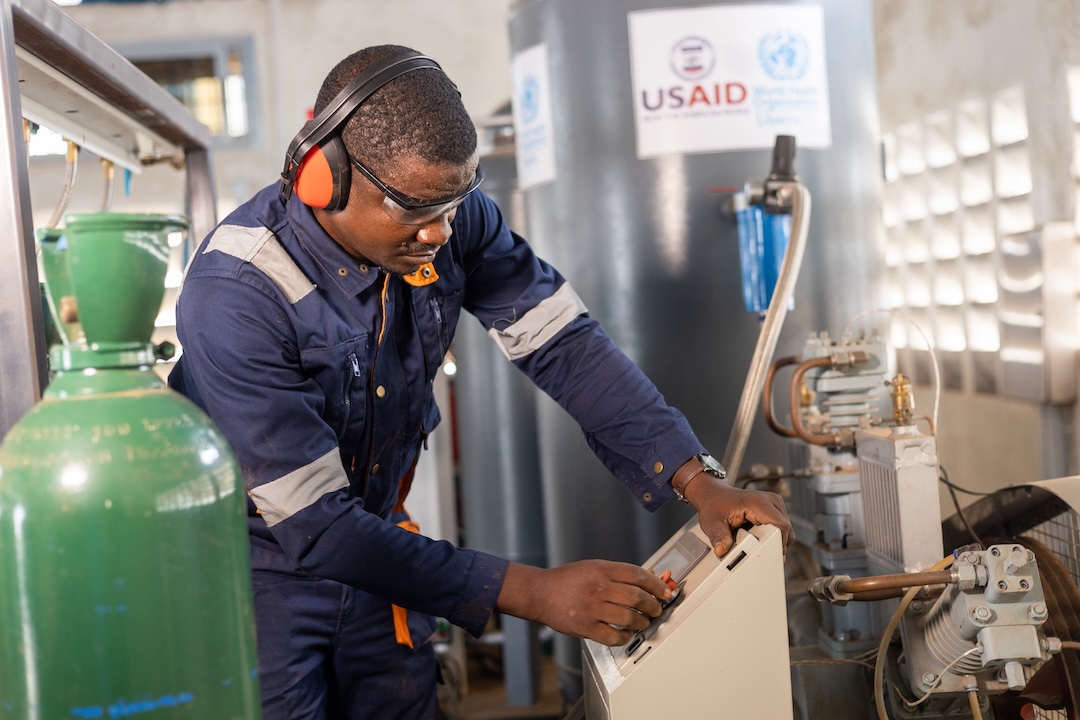Liberia: Scaling up access to life-saving medical oxygen
Tubmanburg – Late one night, 44-year-old Irene Mabande’s four-year-old daughter Emerald suffered a severe asthma attack at home in Tubmanburg, the capital of Bomi County in the northwest of Liberia. “She was striving for air. She couldn’t breathe on her own,” Mabande recalls. “In the hospital, they did not have a nebulizer for asthmatic patients, so the only thing that could bring her back was oxygen.”
Reliable access to medical oxygen is a vital component of a robust health system, a life-saving essential medicine that supports critical medical interventions and helps to ensure effective responses to a wide range of health challenges. However, a lack of uninterrupted access to oxygen in Liberia has contributed to preventable deaths, a problem amplified by the COVID-19 pandemic, when demand for medical oxygen surpassed the country’s capacity.
“This was a significant gap in our response to the pandemic,” says Dr Adolfos T. Yeaih, Director of Emergency Response Services at Liberia’s Ministry of Health. “And the little oxygen that we could acquire from commercial sources did not have the kind of purity that was required to treat people adequately.”
In a bid to address this deficit, in 2022, local health authorities, with funding from the United States and German governments, and support from World Health Organization (WHO), established two new state-of-the-art pressure swing adsorption (PSA) oxygen plants. One plant is at the Star Base on Bushrod Island in Monrovia, and the other at Liberia Government Hospital in Bomi County.
“Oxygen supply was a real problem within this hospital. The establishment of the oxygen plant has been a great help for us.” Sylvester Tolgai, nurse anaesthetist, Liberia Government Hospital
Recognizing the importance of uninterrupted power for sufficient, consistent oxygen production, WHO also procured and installed backup generators for the new plants, supplied diesel fuel for their operation, and facilitated the connection of the Star Base plant to the national grid to further enhance its reliability.
These plants were established to complement three pre-existing on-site medical oxygen plants in Liberia, only one of which supplies oxygen to other health facilities. In contrast, the new plants distribute oxygen cylinders to health facilities across five counties, serving a population of approximately 2.3 million people. From April 2023 to June 2024, they produced and distributed a total of 4551 cylinders, delivering crucial support to over 2000 critically ill patients.

Mabande’s daughter was one of the beneficiaries of this important intervention, which has seen the percentage of health centres and hospitals providing medical oxygen nationwide increase from 51% in 2021 to 67% in 2023. “As soon as they established the oxygen, she started taking breaths, and she was stabilized,” Mabande says. “She came back.”
Sylvester Tolgai is a nurse anaesthetist at Liberia Government Hospital, where until recently this kind of positive outcome was all too often not the case. “Oxygen supply was a real problem within this hospital,” he says. “The establishment of the oxygen plant has been a great help for us. It has helped us to reduce the mortality rate at the hospital. It is a really good initiative for us and our patients.”
As part of a comprehensive roadmap to keep scaling up access to medical oxygen across all 15 of Liberia’s counties, WHO has also supported the Ministry of Health in training over 200 clinicians on oxygen therapy. Twenty biomedical engineering technicians have also gained expertise in the safe operation and maintenance of the new oxygen plants, while a dedicated training centre was established at the Star Base plant for ongoing capacity building.
“Without the oxygen, she [my daughter] would not be here today.” Hawa Morris, mother
The roadmap also seeks to repair damage to existing PSA plants, improve emergency preparedness and critical care delivery, install medical gas piping in all major referral hospitals across Liberia, and equip ambulances with sufficient oxygen supply and advanced life support features.
“Liberia has made significant strides towards ensuring access to medical grade oxygen for all,” says Dr Clement Peter, WHO Representative in Liberia. “As COVID-19 highlighted, medical oxygen can be the difference between life and death and the country must be commended for making this a priority in its pursuit of universal health coverage.”
Back in Tubmanburg, 39-year-old Hawa Morris plays with her 18-month-old daughter Princess outside her home. Last year, Princess was admitted to Liberia Government Hospital with severe bacterial infection. “Without the oxygen, she would not be here today,” Morris says. “I am so grateful.”
Communications and marketing officer
Tel: + 242 06 520 65 65 (WhatsApp)
Email: boakyeagyemangc [at] who.int (boakyeagyemangc[at]who[dot]int)
Communications Officer
Phone : (266) 590 17166
Email: nangwalel [at] who.int (nangwalel[at]who[dot]int)
